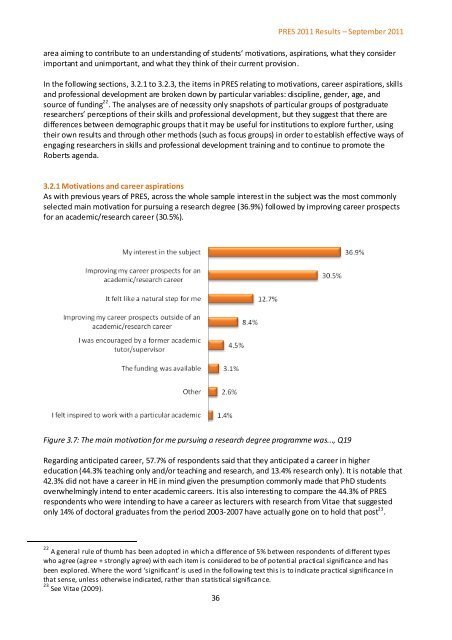Postgraduate Research Experience Survey (PRES) 2011 - Higher ...
Postgraduate Research Experience Survey (PRES) 2011 - Higher ...
Postgraduate Research Experience Survey (PRES) 2011 - Higher ...
Create successful ePaper yourself
Turn your PDF publications into a flip-book with our unique Google optimized e-Paper software.
<strong>PRES</strong> <strong>2011</strong> Results – September <strong>2011</strong><br />
area aiming to contribute to an understanding of students’ motivations, aspirations, what they consider<br />
important and unimportant, and what they think of their current provision.<br />
In the following sections, 3.2.1 to 3.2.3, the items in <strong>PRES</strong> relating to motivations, career aspirations, skills<br />
and professional development are broken down by particular variables: discipline, gender, age, and<br />
source of funding 22 . The analyses are of necessity only snapshots of particular groups of postgraduate<br />
researchers’ perceptions of their skills and professional development, but they suggest that there are<br />
differences between demographic groups that it may be useful for institutions to explore further, using<br />
their own results and through other methods (such as focus groups) in order to establish effective ways of<br />
engaging researchers in skills and professional development training and to continue to promote the<br />
Roberts agenda.<br />
3.2.1 Motivations and career aspirations<br />
As with previous years of <strong>PRES</strong>, across the whole sample interest in the subject was the most commonly<br />
selected main motivation for pursuing a research degree (36.9%) followed by improving career prospects<br />
for an academic/research career (30.5%).<br />
Figure 3.7: The main motivation for me pursuing a research degree programme was..., Q19<br />
Regarding anticipated career, 57.7% of respondents said that they anticipated a career in higher<br />
education (44.3% teaching only and/or teaching and research, and 13.4% research only). It is notable that<br />
42.3% did not have a career in HE in mind given the presumption commonly made that PhD students<br />
overwhelmingly intend to enter academic careers. It is also interesting to compare the 44.3% of <strong>PRES</strong><br />
respondents who were intending to have a career as lecturers with research from Vitae that suggested<br />
only 14% of doctoral graduates from the period 2003-2007 have actually gone on to hold that post 23 .<br />
22 A general rule of thumb has been adopted in which a difference of 5% between respondents of different types<br />
who agree (agree + strongly agree) with each item is considered to be of potential practical significance and has<br />
been explored. Where the word ‘significant’ is used in the following text this is to indicate practical significance in<br />
that sense, unless otherwise indicated, rather than statistical significance.<br />
23 See Vitae (2009).<br />
36
















